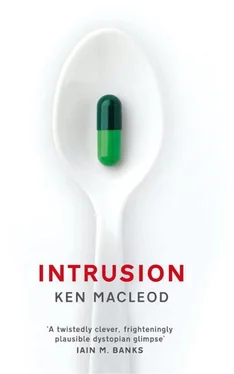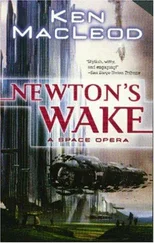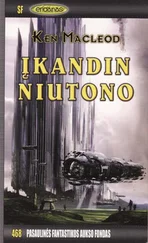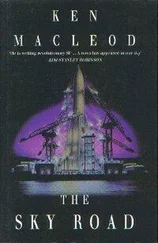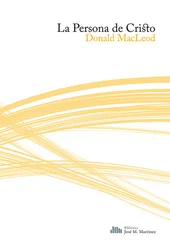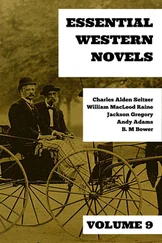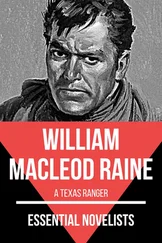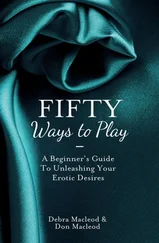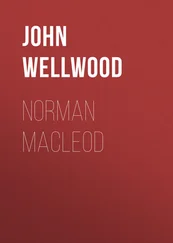‘Let’s get breakfast,’ she said.
‘Yes!’ said Nick. ‘I’ll get Max. He’s hungry too.’
‘Hugh, do you want a coffee and toast?’
But Hugh was already snoring again. Hope went through to the kitchen and made eggy soldiers for Nick and toast and honey for herself. As they ate, the garden brightened outside. The sky, visible by ducking down and looking up, was blue.
‘Railway walk?’ Hope asked.
‘Yes!’ said Nick. ‘Railway walk, railway walk!’
So that was that. Saturday, sorted.
The railway walk was Parkland Walk. The nearest entrance was a kilometre or so along East West Road to the east of Victoria Road. Hope, Hugh, and Nick with Max on his shoulder set off about eleven. Hugh had the buggy folded up and concealed in a small rucksack, just in case. Parkland Walk followed the path of an old railway line, through a long cutting for most of its route. It was the first time they’d been there since the late autumn, and Hope felt a little down on seeing it still looked like winter. Mud, dead leaves, bare branches, a few buds, shopping trolleys, litter, frost in the shadows. But Nick ran ahead, breaking thin ice and splashing through puddles in his wellies and sending Max shinning up trees.
After a while she said to Hugh: ‘We could just go on walking.’
‘What?’
Hope waved a vague encompassing hand ahead.
‘There are walks everywhere, they all connect up. Canal banks, cycle paths, that sort of thing. We could walk from here to anywhere in Britain and hardly go on the main roads.’
‘We could,’ said Hugh. ‘If we didn’t have to sleep or eat.’
‘We could camp out,’ said Hope, ‘and live off the land.’
‘The berries don’t come out for months,’ said Hugh. ‘And the squirrels are skinny even when you can dig them out. Mind you, the roadkill keeps well at this time of year. Like a deep freeze, practically. And we could recharge the monkey at fuel stations, if we took the adaptor. Yeah, that sounds like a plan.’
‘You’re not taking me seriously.’
‘That I’m not. And why would we want to walk to anywhere, anyway?’
‘If we had to get away.’
‘Jeez.’ Hugh didn’t sound amused. ‘That’s not how you do it. There’s no away .’
‘People talk about going off grid.’
‘Yeah, they do. They talk about it. On the net. Nowhere’s off grid any more.’
‘There must be,’ said Hope. ‘There must be a place.’
Nick had stopped by the side of the path up ahead, and squatted down to gaze into the dark space underneath a huge holly bush. Max, programmed to occasionally ape its owner’s actions, squatted beside him. As Hugh and Hope approached, they heard Nick talking, as if to someone under the bush. His elbows were propped on his knees, and he gestured with his hands and forearms, each motion mimicked by Max.
Hope turned to Hugh, smiling, and raised a finger to her lips.
‘Cute,’ she murmured.
Hugh nodded. But he waited only a few seconds, and then coughed, and scuffed the ground as he strode forward.
‘Yes,’ he said to Hope as he reached for Nick’s hand and scooped Max to his shoulders. ‘There is a place.’
He sounded happy.
There was a place. Hugh was fairly sure it existed and wasn’t one of his visions. The other lads, Malcolm and Donald, had seen it too. The reason he couldn’t be entirely sure was that the lads were Leosich themselves, and they could have had the second sight too, for all he knew, and spoken of it no more than he did. But he was almost sure there was more to it than that, even to this day: that the glimpse his pals had shared, and denied, was of some far reality. Hugh’s guesses as to the nature of its reality varied on a sliding scale of scepticism and self-mockery: an objective phenomenon, a space-time anomaly, a land under the hill, a fairy land, Tir Nan Og…
They’d all been about twelve years old at the time: old enough for big school, the Nicolson Institute in Stornoway. Old enough to look with a sort of affectionate pity at wee school, Valtos Primary, when they came back to Uig for the summer holidays. Seeing the parish again after a couple of terms in the town was unsettling. The black houses and the white, the sheep-fanks and bothans, the corrugated-iron sheds, the dry-stone walls another inch deeper in the grass, the ruins and the new build, the rusting cars and tractors in the middle of fields, all seemed primitive and petty, almost shameful to be associated with, something you’d outgrown like childhood toys. Only the windmills and the wooden houses looked modern.
The boys and girls whose parents were natives or settlers had work to do on the crofts or in the shops. The girl children of the wind-farmers had help to give their mothers around the house. The boys didn’t (unlike the girls, who had home management in their curriculum). They mooched. They hung around the turbines and got in the way of the workers. Goggled and gloved, gaming, they squandered sunny days indoors until their mothers yearned to chase them out of the house with sticks.
Then a morning came when Hugh looked out of his bedroom window to see a sky whose blue was so deep and dark that he could have been looking at it through Polaroid sunglasses. He couldn’t imagine staying inside. He pinged Malcolm the minister’s son and Donald the rigger’s boy. About half an hour later they met in the back yard of the house where Hugh lived. The house was a mile and a half away from the wee school that overlooked the bay. It stood on the slope of a hill, the highest house in a village that, like most villages in Lewis, consisted of a cluster of half a dozen old houses, a few new ones and sites for several more, all scattered around the landscape for hundreds of metres. The road ran below it, over a culvert where a stream from a small freshwater loch at one side of the hill flowed into the sea-loch around whose shore the village was spread. Minnows swam in that burn, preyed on by an eel, long and old and black, that lurked under the culvert.
The three boys scuffed pebbles in the yard and debated the shore or the loch or the glen farther up the road, but the deep blue of the sky turned their eyes to the hills above the village, and up to the hills they went. Within the old manse’s glebe the ground was mossy and the grass long. Beyond the fence above it – the barbed wire was tufted with sheep’s wool – the lads were wading through heather, tough and springy, that scratched at their ankles and tugged at their trousers. Old ash from past muir-burnings puffed up around their feet, making them cough, and blackening their trainers within minutes. Black-faced sheep and months-old lambs gave them the yellow slot-eyed stare, chewing impassively, or panicked for no clear reason and bounded away, then forgot why they were running and stopped to graze again.
The hill was not very high, but it was higher than it looked. As soon as the boys had toiled up one slope, another would loom ahead, usually with a bog to cross before they got there. The slopes themselves were strewn with erratic boulders, some big enough to have their own overhang and cave-like declivity beneath. After about twenty minutes of climbing, the boys reached the summit, a broad plateau of rocky outcrops crusted with lichens, some of them grey-green and others orange like splashes of earth-moving-machinery paint.
Hugh stood with the others and looked around. He knew that he was near the junction of two almost peninsular promontories of the long island: the one that stretched ahead of him across moor and lochs and hills to the distant headland of Aird, and the one behind and to his right, where the sea he could glimpse beyond the little long loch in the glen – the Atlantic that broke on the bay that the wee school overlooked, and whose sand was just visible from where he stood – was the same sea as lapped the village shore, via a few zigzag miles of beaches, cliffs and headlands hidden behind the hills immediately in view. Turning farther around to his left, his gaze swept that inlet and the hills and glens to the western horizon. From this height it was suddenly obvious that the land wasn’t made of peat with rocks sticking out, but of rock with an uneven and broken overlay of peat like frayed hessian sacking over rubble. Clear too were the drove roads along the sides of the glens and across the moors, relict pathways along which cattle had once been driven and that now even sheep did not frequent. On almost every hilltop the blades of the great windmills spun like slow clockwork. The wind seldom ceased on Lewis, but today it was little more than a warm breeze.
Читать дальше
